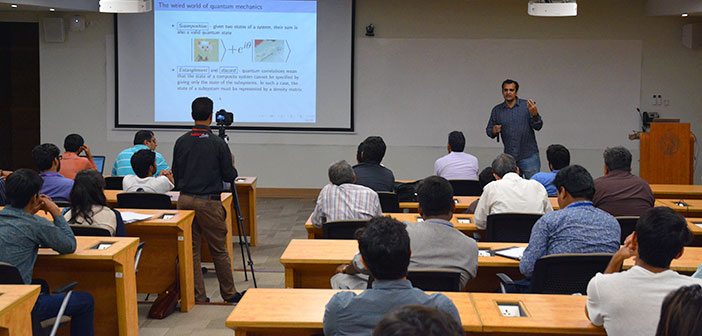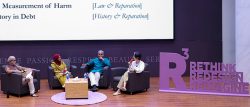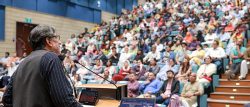HABIB UNIVERSITY: There is little doubt that Quantum Mechanics will reshape the face of the planet and humanity in the coming decades. The current hardware technology is reaching its limit in exploiting Moore’s law to make more compact and powerful computation devices. As boundaries of knowledge are being pushed further, the need to have more powerful computers is immense. Quantum Computing technology is rapidly developing as the future of computation, however, a real life Quantum Computer is far from replacing our current computers.
Dr. Adam Zaman Chaudhry’s talk on ‘The Effect of Repeated Measurements in Quantum Systems’, here at Habib University’s Soorty Lecture Theater, turned into an intensely interactive session as professionals and students from around Karachi took the opportunity to gain a deeper understanding of the world of Quantum Computing.
Organized by Habib University’s School of Science & Engineering (SSE) as part of the SSE Public Lecture Series, the talk attracted a large audience of students from both Habib University and other educational institutions across Karachi.
Computation in Quantum Computers involves measuring the state of an underlying quantum system. A quantum system simultaneously exists in multiple states. When a measurement is made on the system, it assumes one of the possible states available by collapsing the wave function of the system. If the system is described at any point in time, it can be described at any other point using the time evolution operator in the Schrödinger equation.
Rapid measurements on the quantum systems freezes the evolution of the system in time due to repeated collapse of the wave function; this is called the Quantum Zeno Effect (QZE). However, if no measurements are made then the states of the system rapidly evolve at an accelerating rate; this is called the Quantum Anti-Zeno Effect (QAZE). Such rapid evolution of a quantum system can threaten the coherence between the states of the system. Thus both these effects are important parameters in developing computation techniques in Quantum Computers.
Both Zeno and Anti-Zeno effects have been studied in a wide variety of quantum systems. In his talk, Dr. Zaman spoke about the basics of the concept of measurement in Quantum Mechanics. He further went on to elaborate on the Zeno and Anti-Zeno Effect. He explained how the decay time of quantum systems has always been studied in context of particular quantum systems like superconducting qubits, nano-mechanical oscillators, Josephson junction etc. He then further explained his work in which, for the first time, these effects have been studied in a general framework which is applicable to weakly interacting quantum systems.
He concluded his talk by elaborating on his plans to study this problem in a more general way by extending the formalism to strongly interacting systems.




